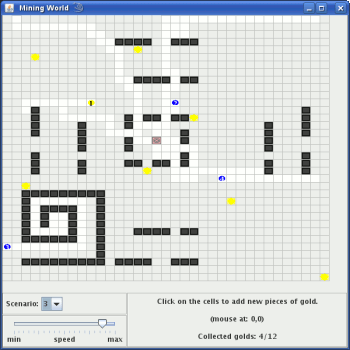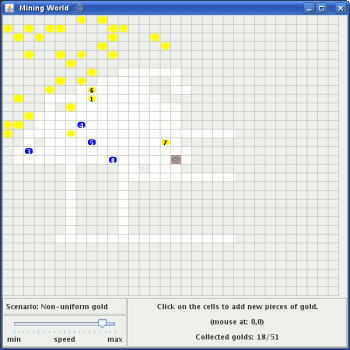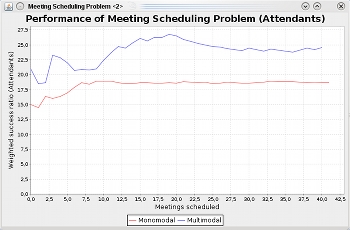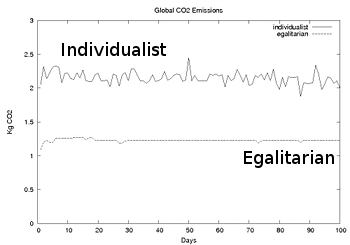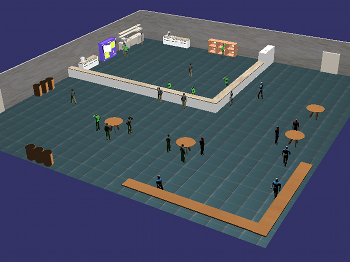MADeM overview
The MADeM (Multi-modal Agent Decision Making) model provides agents with a general mechanism to make
socially acceptable decisions. In this kind of decisions, the members of an organization are required to express their
preferences with regard to the different solutions for a specific decision
problem. The whole model is based on the MARA (Multi-Agent
Resource Allocation) theory, therefore, it
represents each one of these solutions as a set of resource
allocations. MADeM can consider both tasks and objects as
plausible resources to be allocated, which it generalizes under the
term task-slots. MADeM uses first-sealed one-round
auctions as the allocation procedure and a multi-criteria winner
determination problem to merge the different preferences being
collected according to the kind of agent or society simulated. Thus, the formal definition of a MADeM decision can be
represented by the following tuple:
<a, Al, Ag, Pw, Uf, Uw, Cuf>
where:
a ∈ A is the agent in charge of making a social decision, where A is the set of all agents in the society.
Al is the set of resource or task-slots allocations representing all possible solutions for a specific decision problem.
Ag ⊂ A is the subset of agents being consulted or target agents, which can be either infered from the organisational structure or maintained locally.
Pw: Ag → ℜ are the personal weights (i.e. personal attitudes) that are used to balance the preferences received from each agent in Ag.
Uf is the set of utility functions of the form u: Al x Ag → ℜ representing the agents' preferences with regard to the resource allocations considered.
Uw: Uf → ℜ are the utility weights that are used by the agent a to balance the importance given to each utility function in Uf when resolving the winner determination problem.
Cuf ∈ {elitist, egalitarian, utilitarian, nash} is the collective utility function representing the social welfare of the simulated society, that is, the type of society where agents are located.
For a complete explanation of the MADeM model click here.
J-MADeM
MADeM is available as an open source library fully integrated into Jason under the name J-MADeM. The aim of J-MADeM is to improve Jason by incorporating the main features of MADeM. Thus, J-MADeM agents can easily define the utility functions expressing their preferences and find socially acceptable decisions for specific decision problems.
Related publications
Some documents distributed by this server have been provided by the contributing authors as a means to ensure timely dissemination of scholarly and technical work on a noncommercial basis. Copyright and all rights therein are maintained by the authors or by other copyright holders, notwithstanding that they have offered their works here electronically. It is understood that all persons copying this information will adhere to the terms and constraints invoked by each author's copyright. These works may not be reposted without the explicit permission of the copyright holder.
Towards a Model for Urban Mobility Social Simulation - A perspective from J-MADeM Decision Making. Francisco Grimaldo, Miguel Lozano, Fernando Barber, Alejandro Guerra-Hernández. Special Issue on MAS Applications in Transports. Journal Progress in Artificial Intelligence. May 2012.
doi: http://dx.doi.org/10.1007/s13748-012-0012-z.
J-MADeM, a market-based model for complex decision problems Francisco Grimaldo, Miguel Lozano, Fernando Barber. Logic Journal of the IGPL. Oxford University Press. April 2011.
doi: http://dx.doi.org/10.1093/jigpal/jzq028.
J-MADeM v1.1: A full-fledge AgentSpeak(L) multimodal social decision library in Jason Francisco Grimaldo, Miguel Lozano, Fernando Barber, Alejandro Guerra-Hernández. The 8th European Workshop on Multi-Agent Systems (EUMAS 10). Paris (France), December 2010.
J-MADeM, an open-source library for social decision-making Francisco Grimaldo, Miguel Lozano, Fernando Barber. 12è Congrés Internacional de l'Associació Catalana d'Intel·ligència Artificial (CCIA 2009). Cardona (Catalonia-Spain), October 2009.
MADeM: a multi-modal decision making for social MAS Francisco Grimaldo, Miguel Lozano, Fernando Barber. Autonomous Agents and Multiagent Systems (AAMAS 2008). ACM Press, Estoril (Portugal), May 2008.

